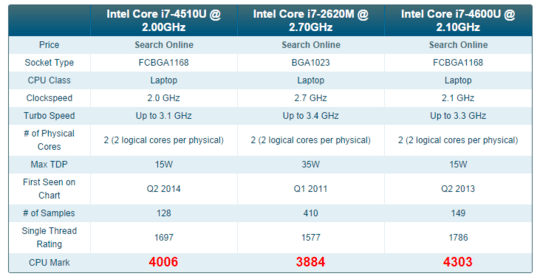0
I'm looking at buying a new laptop PC (my old one is failing). I noticed the latest CPU clock speeds are lower than my current one though the CPUs are newer. It used to be that a higher clock speed meant better performance but obviously this is no longer true.
So when I compare CPUs, how do I know what's good or bad? See below a screenshot of 3 CPUs. The one with the worst score is my current CPU.
Thanks, David.
- Intel Core i7-4510U @ 2.00GHz
- Intel Core i7-2620M @ 2.70GHz
- Intel Core i7-4600U @ 2.10GHz

1Why are you trying to compare a Sandybridge part to a Haswell parts? You cannot compare them, alright you can, but it doesn't make sense to since they would require entirely different hardware. The 4600U is a Haswell and 4510U is a haswell refresh part. – Ramhound – 2014-09-30T16:33:10.160
You're kind of making my point: I don't know enough about these differences / architecture to make a judgement. – David Brossard – 2014-09-30T16:59:37.537
Higher clock speed meant better performance has not been true since the P4 times (about 2003). – Hennes – 2016-12-05T13:33:02.700
As Ramhound pointed out you should start by comparing apples. So Haswell to Haswell. In order to get a grasp on the performance difference between different architectures you would have to try to get a good understanding of each or would have to rely on empiric data like benchmark results comparing them. In a best case you would try to understand what the benchmark actually benchmarks to have an idea of what their score indicates. – Seth – 2016-12-05T13:54:11.793